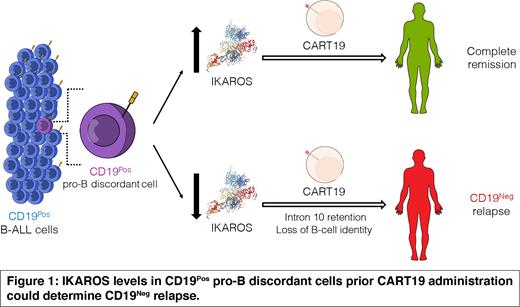Abstract
Despite impressive response to front-line treatment, relapsed or refractory B-cell acute lymphoblastic leukemia (r/r B-ALL) remains one of the most common causes of death in children with cancer. In pediatric and adult r/r B-ALL, CD19 CAR T cell (CART19) therapy has shown impressive results with over 80% of patients achieving complete remission. However, as an unintended consequence of long-term persistence of CAR T cells and the resulting sustained pressure against CD19 expressing cells, 30 - 70% of initial responders will eventually relapse with CD19 loss. Early identification of patients that will respond successfully to CART19 therapy vs. those at risk for CD19 Neg relapse would support clinical decision making and improve patient care.
To address this problem, we profiled by mass cytometry (CyTOF) 25 pre-CART19 samples including patients that achieved a durable complete remission (CR, n = 6), patients that underwent CD19 Neg (n = 11) or CD19 Pos relapse (n = 4) and patients that were refractory to CART19 (n = 4). For 14 of those patients, we also analyzed paired post-CART19 samples: 8 from CD19 Neg relapse, 2 from CD19 Pos relapse, and 4 from refractory tumors. We observed a significant increase in the proportion of leukemic early progenitor non-B cells (called early-non-BI) after CD19 Neg relapse, suggesting that CD19 loss is associated with the loss of other B cell features. In addition, in the pre-CART19 samples we identified a subpopulation of CD19 Pos pro-B cells that resemble early-non-BI cells. We hypothesized that these pro-B "discordant" cells are able to lose CD19 expression and escape the immune pressure exerted by the CART19, leading to CD19 Neg relapse. Closer analysis revealed lower levels of IKAROS in pro-B discordant cells from patients that underwent CD19 Neg relapse, than in those that achieved a durable CR.
To further explore the difference between pro-B discordant cells from patients that achieved a durable CR or underwent CD19 Neg relapse, we performed single cell REAP-seq (RNA expression and protein sequencing) from 3 pre-CART19 CR and 3 pre-CART19 CD19 Neg relapse r/r B-ALL samples. From this analysis, we confirmed a subpopulation of leukemic pro-B like cells with decreased expression of IKZF1 in those patients that underwent CD19 Neg relapse.
IKAROS is a transcription factor that plays a crucial role in B cell lineage specification and commitment and is a known B-ALL tumor suppressor. Genetic alterations affecting the IKAROS gene, IKZF1, have been associated with poor response to front-line treatment and they are a factor in relapse risk stratification. However, a role for IKAROS in CART19 failure has not been described. To assess if there is a correlation between the levels of IKAROS and CD19 surface expression, we manipulated IKAROS levels in B-ALL cell lines through RNA silencing and targeted protein degradation approaches. Consistently, we observed that CD19 surface expression diminishes upon IKAROS downregulation. To determine how IKAROS regulates CD19 expression, we performed CyTOF, RNA-seq and ATAC-seq analysis of isogenic B-ALL cell lines with wild-type or reduced (IKAROS KD) IKAROS levels. While the chromatin accessibility to CD19 regulatory regions did not change, CD19 mRNA levels were lower in IKAROS KD cells. Interestingly, we found that IKAROS regulates several genes associated with mRNA splicing. In particular, CD19 mRNA preferentially retains intron 10 in IKAROS KD cells. The inclusion of intron 10 introduces several premature stop codons. Moreover, IKAROS KD B-ALL cells more closely resemble myeloid cells based on their gene expression profiles, suggesting a loss in their B cell identity.
In summary, this is the first description of a leukemia-specific subpopulation of CD19 Pos pro-B discordant cells in patients prior CART19 administration. Furthermore, lower levels of IKAROS in this subpopulation correlates with poor response to CART19 therapy. Preliminary molecular analysis suggests that low IKAROS result in retention of CD19 intron 10 and loss of B-cell identity (Figure 1). Future research will focus on in-depth characterization of the myeloid-like phenotype induced by low levels of IKAROS expression, and the impact that intron 10 retention has on CD19 mRNA stability and surface expression.
Mullighan: Pfizer: Research Funding; Amgen: Current equity holder in publicly-traded company; Illumina: Membership on an entity's Board of Directors or advisory committees; AbbVie: Research Funding. Grupp: Novartis, Roche, GSK, Humanigen, CBMG, Eureka, and Janssen/JnJ: Consultancy; Novartis, Adaptimmune, TCR2, Cellectis, Juno, Vertex, Allogene and Cabaletta: Other: Study steering committees or scientific advisory boards; Novartis, Kite, Vertex, and Servier: Research Funding; Jazz Pharmaceuticals: Consultancy, Other: Steering committee, Research Funding. Barrett: Tmunity Therapeutics: Current Employment. Davis: Novartis Pharmaceuticals: Honoraria; Jazz Pharmaceuticals: Research Funding.


This feature is available to Subscribers Only
Sign In or Create an Account Close Modal